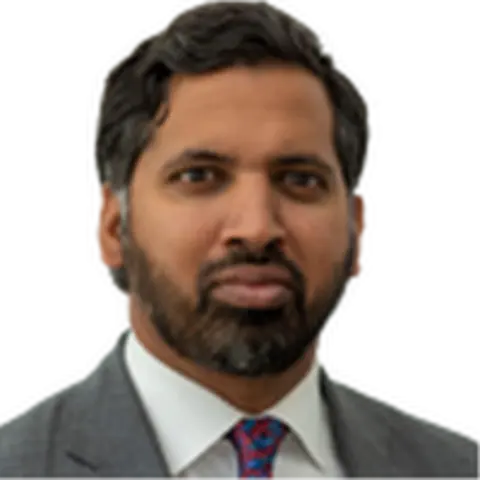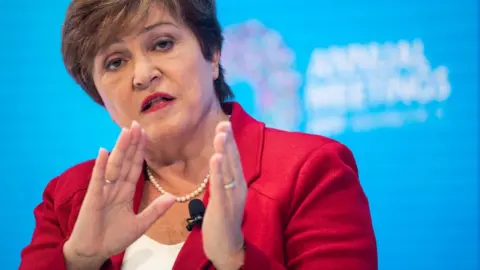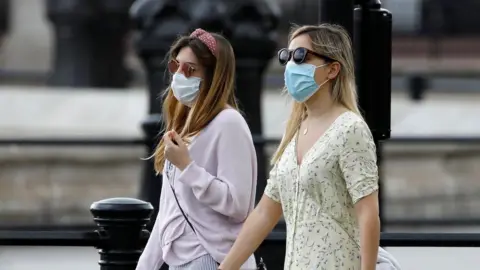IMF head: Dire economic forecasts may be too optimistic

 AFP
AFPHow do you co-ordinate economic policy across the globe, when an invisible enemy that behaves in unknown ways systematically erodes the very way economies function?
That is the tricky challenge facing the relatively new managing director of the International Monetary Fund, Kristalina Georgieva, who sat down with me to discuss this in her first British broadcast interview.
The IMF is now a fire fighting service battling multiple infernos, almost everywhere. This discussion was meant to take place face to face at the IMF's annual meetings in Washington DC. But for obvious reasons, those meetings became virtual, as did my interview with her.
First up, a refreshing admission. Just three months ago, the IMF's January economic forecast update projected that the base unit of living standards - the per person size of the economy or GDP per capita - would be going up in 160 countries. That would have meant 82% of nations becoming better off in 2020.
Now, in April, because of Covid-19, she says: "We are projecting 170 countries to see income per capita shrinking during 2020" - 87% of the atlas of the world.
And yet this detail - which is part of a broader forecast that sees world GDP dive 3% in 2020, creating "a global recession we have not seen in our lifetimes" - may not be the end of it.
"I want to stress this may be actually a more optimistic picture than reality produces," Ms Georgieva told the BBC.
"Epidemiologists are now helping us making macroeconomic projections. Never in the history of the IMF have we had that. And what they're telling us is that the novel coronavirus is a big unknown, and we don't know whether it may return in 2021."
'Accountability and transparency'
It is small wonder that the IMF is in rescue mode. The organisation traditionally tasked with being a fiscal watchdog and ambulance for the world now has a rather different message - that the priority everywhere has to be lives and livelihoods.
"It is the time that governments should spend as much as they can afford and more, but keep the receipts. We don't want to lose accountability and transparency during this crisis," Ms Georgieva says.
"We will see some countries being able to do more, and actually, the UK has already done quite a lot. And we will see some countries that will need more help because they have much more limited capacity to act. And this is where the IMF and other international financial institutions come into play."
 Getty Images
Getty ImagesIn these times of ultra-low interest rates, she says, the IMF can help countries to get more ammunition to fight the health crisis, but also to deal with the economic fallout.
"We need to target support to the most vulnerable people in the most vulnerable parts of the economy," Ms Georgieva says.
Cautious approach
Interventions now will help spur a rapid bounce-back in growth and reduce permanent economic scars. But despite the depth and breadth of the downturn, she is very cautious about prematurely lifting shutdowns around the world.
"Saving lives and saving livelihoods go hand in hand with stopping the pandemic. We simply cannot restart the economy to the fullest, and without restarting the economy, finance ministers are not going to have the revenues they need, including for their health services," Ms Georgieva says.
"So we have to, of course, listen to the health professionals and design protocols that allow us over time to reopen segments of the economy and do that cautiously. We have to then carefully calibrate how we're doing this reopening."
She suggests that automated factories and rural areas might be easier to reopen, but there is still some "figuring out" to do around reopening busy cities and towns.
'We need each other'
Ms Georgieva warns against what has been dubbed "pandemic protectionism", where some advanced countries have sat on medical equipment and pharmaceutical supplies for use domestically.
"It's a very simple message - you cannot beat the virus unless you beat it everywhere. When one country is suffering from an epidemic, then it makes sense to be protective and keep what the country needs domestically.
"But when we are all hit by an epidemic... we need to act together. And we would very much encourage countries to actually integrate their capabilities rather than trying to keep it each one for itself."
But her central message is to look beyond the understandable concern for what is happening in the world's advanced nations, to the problems facing poorer ones. The G20's decision to suspend debt repayments from the world's most deprived countries was a start, but she says we must remain mindful.
"Poor countries in the world are hit multiple times. They're hit by the the pandemic. They're hit by the spillover from economic contraction elsewhere. They're hit by the flight to safety," Ms Georgieva says.
"$100bn has left emerging markets in developing countries just in two months, much more than during the global financial crisis. They're hit because remittances are drying up. And those that are commodity exporters are hit by prices of their exports dropping."
She says "lifelines" are needed now for such countries, such as the debt standstill which would free billions for health services. "We need each other. It is a moment testing our humanity and being together acting with solidarity. We will get to the other side of this."

- A SIMPLE GUIDE: How do I protect myself?
- AVOIDING CONTACT: The rules on self-isolation and exercise
- HOPE AND LOSS: Your coronavirus stories
- STRESS: How to look after your mental health

